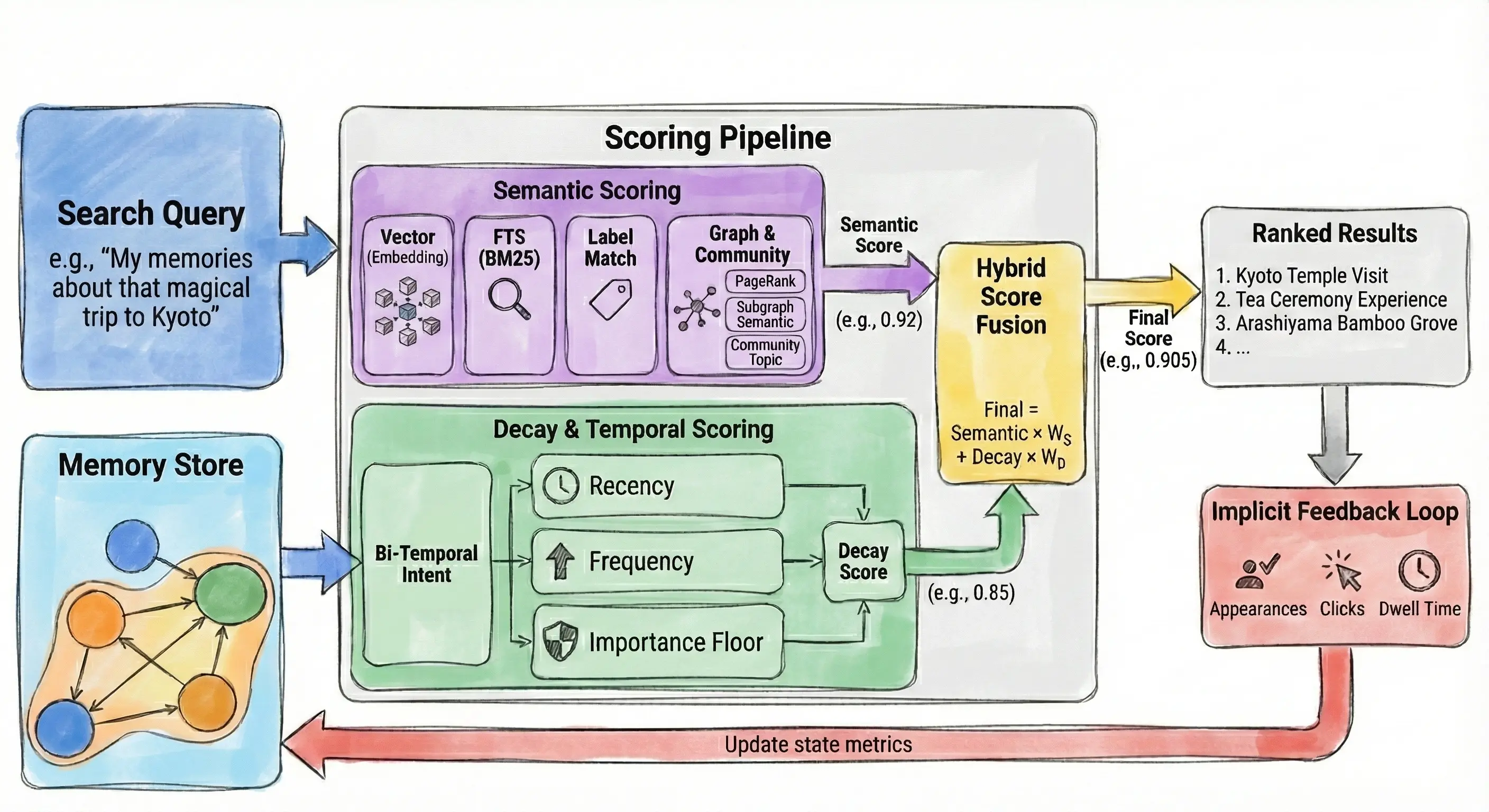The Problem
Our brain doesn’t remember everything equally.
The coffee you had this morning? Fading fast. The wedding day? Crystal clear decades later. The breakthrough idea from last month’s brainstorm? Still fresh because you’ve been building on it.
Our brain naturally prioritizes. It’s not a bug, it’s a feature that took millions of years of evolution to perfect.
Yet most digital memory systems treat all information equally. That decision you made three years ago sits right next to today’s breakthrough insight, competing for your attention with equal weight.
Search for something, and you’re buried under an avalanche of equally-weighted results.
What If
What if our personal memory system could work more like our brain?
What if recent and frequently-used knowledge naturally surfaced first, while old unused memories politely stepped aside?
What if we could ask “what did we decide last quarter?” and actually get memories from last quarter?
How We Did It
We looked at how cognitive scientists model human memory, particularly ACT-R from Carnegie Mellon and FSRS by Jarrett Ye, which powers modern spaced repetition systems like Anki.
From this research, we built a practical memory decay model:
-
Recency matters. Memories you’ve accessed recently score higher. We use exponential decay with about a 30-day half-life, so a memory from yesterday ranks much higher than one from three months ago.
-
Frequency reinforces. Memories you access repeatedly become more durable. Your behavior teaches the system what matters.
-
Importance sets a floor. Foundational knowledge with high importance never fully fades, even if unused.
-
Your feedback shapes relevance. Inspired by FSRS’s approach to tracking retrieval success, we track appearances, clicks, and dwell time. High click-through rate? The memory is genuinely useful. Long dwell time? Valuable content worth reading.
 Nowledge Mem Scoring Pipeline
Nowledge Mem Scoring Pipeline
The result: search that feels intuitive. The right memories surface when you need them.
Understanding Time
Beyond relevance, we tackled another challenge: temporal queries.
Consider these searches:
- “What happened before we migrated the database?”
- “Memories from Q3 last year”
- “Recent insights about authentication”
These aren’t just keyword searches. They’re questions about when things happened.
And here’s the tricky part: there are two kinds of time.
-
Event time: When did this actually happen? A memory about a 2020 decision has a 2020 event time.
-
Record time: When did you save this? You might record that 2020 decision today, giving it a 2025 record time.
“Recent memories about 2020 events” means something specific: things you saved recently about events from 2020.
Nowledge Mem now understands the difference. And it handles fuzzy references like “around 2020” or “early last year” and translates them into meaningful results.
What This Means
-
Less noise. Old, unused memories don’t clutter your results. They’re still there if you need them, but they step aside for fresher knowledge.
-
Better relevance. When multiple memories match your query, the ones you’ve been actively using rise to the top.
-
Time-aware search. Questions like “what did we decide last quarter?” actually work.
-
Self-organizing. You don’t have to manually archive or delete. Your memory organizes itself based on how you actually use it.
What’s Next
This is just the beginning. We’re continuing to refine how Nowledge Mem understands and prioritizes your knowledge.
If you’re curious about the technical details, check out our Search & Relevance docs for a deeper look at how the scoring system works.
Nowledge Mem is a local-first, graph-augmented personal context manager. Learn more or read the docs.